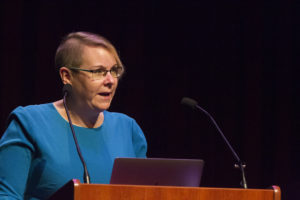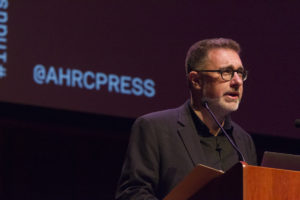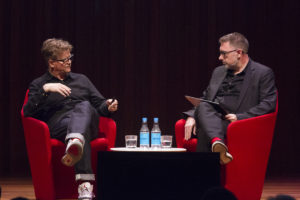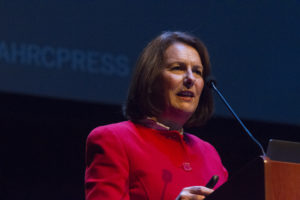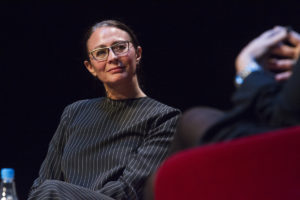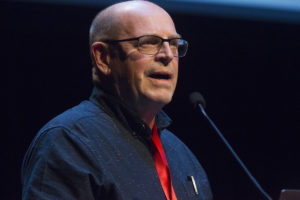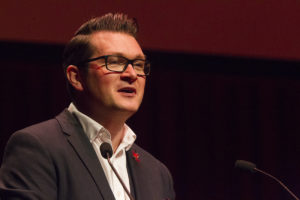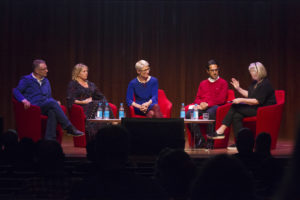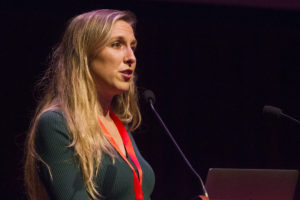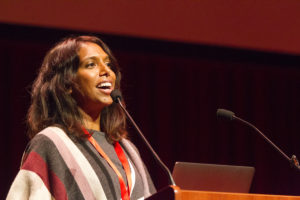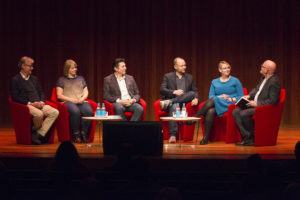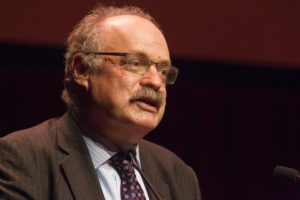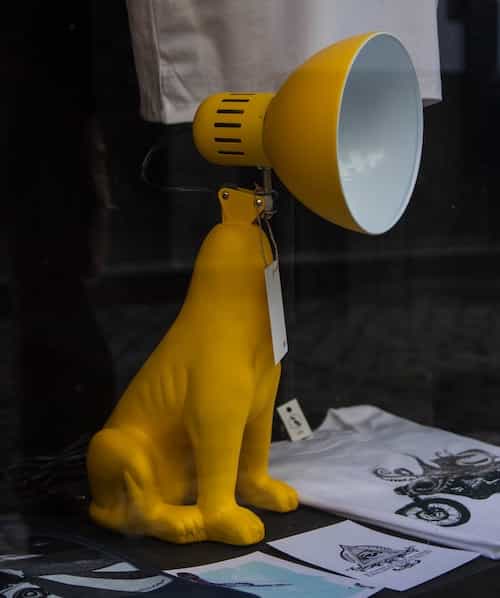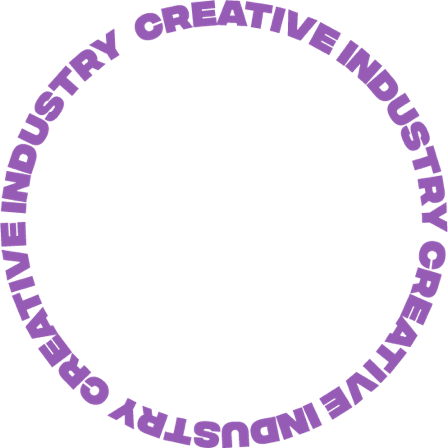
Beyond 2018
Beyond 2018
Beyond 2018
Beyond 2018
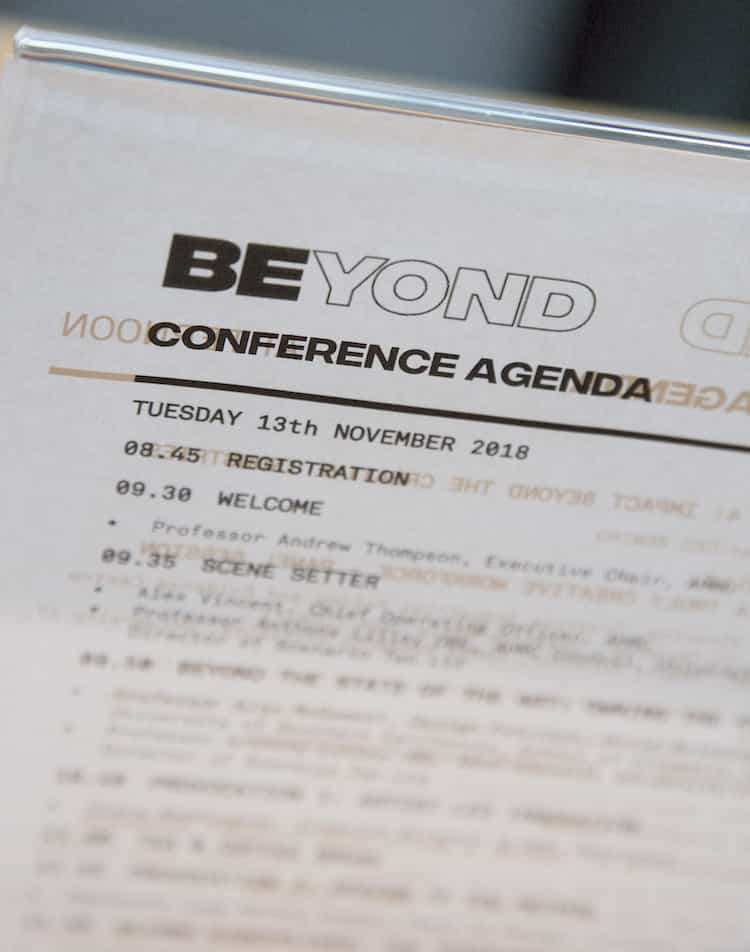
BEYOND 2018 was held at London’s Barbican in November 2018, bringing together business leaders, creatives, researchers, policy makers, journalists, funders and anyone with an interest in the future creative industries.
It showcased the Creative Industries Clusters Programme and the National Centre for Immersive Storytelling, launched in 2018 as part of the UK’s Industrial Strategy. Read on for the full agenda, speaker details, session videos and photos from the event.
More details about this year’s BEYOND programme, tickets, showcasing and speaking opportunities coming in September – sign up for BEYOND updates to be the first to find out.
Videos
Videos
Watch and enjoy all of the sessions from BEYOND in November 2018. A stellar line of speakers addressed key challenges and themes impacting the future of the creative industries.
Gallery
Gallery
Browse and enjoy photos of BEYOND 2018. A stellar line of speakers addressed an audience of business leaders, creatives and researchers.




































































































































































































































Agenda
Agenda
8:45
Registration
9:30
WELCOME
> Professor Andrew Thompson, Executive Chair, AHRC
9:35
Scene Setter
> Alex Vincent. Chief Operating Officer, AHRC
> Professor Anthony Lilley OBE, AHRC Council, University of Ulster, Director of Scenario Two Ltd
9:50
BEYOND THE STATE OF THE ART: OWNING THE FUTURE
Strategic R&D needs a vision of a future world or a way of anticipating future challenges, opportunities and possibilities. By imagining this future world and telling stories about it can we understand the challenges we face? How do leading creatives go about imagining alternative realities and what can their thinking bring to research and development?
> Professor Alex McDowell, Design Futurist, World Building Institute,
University of Southern California, School of Cinematic Arts
> Professor Anthony Lilley OBE, AHRC Council, University of Ulster, Director of Scenario Two Ltd
10:40
PROVOCATION 1: ARTIST-LED INNOVATION
Idea: The prime source of R&D for the creative sector is in the arts.
Though championing diversity in ideas and talent this sector, working with humanities departments of universities, is the prime source of new ideas, methods and creative practices that drive forward the whole of the creative industries.
> Clare Reddington, Creative Director & CEO, Watershed
11:00
TEA & COFFEE BREAK
11:35
PROVOCATION 2: DESIGN IS THE METHOD
Idea: Design as the overarching method for R&D in the creative industries.
Design brings a user-centred approach, solutions focussed but open architecture, a vision that can encompass both products and, increasingly services and experiences.
> Professor Lady Rachel Cooper, Chair in Design, Lancaster University
11:55
BEYOND DISCIPLINES: THE TRANSFORMATION OF FASHION
PANEL SESSION: Like other areas of the creative industries the entire fashion ecosystem is in flux with multiple points of destabilisation. Rather than fear or deny this disruption the UK Fashion industry seems poised to embrace it. But to do so it needs to answer a range of challenges which spread across multiple research disciplines. We explore the nature of these challenges and how they are being met in a fast-moving global sub-sector of the creative industries.
> Jonathan Chippindale, Chief Executive, Holition
> Jennifer Davies, Commercial Director, Nabil Nayal
> Professor Jane Harris, Digital Design & Innovation, Associate Dean Of
Research, London College of Fashion
> Lynda Petherick, Fashion & Luxury Fashion Lead, Accenture UK (Chair)
> Caroline Rush, Chief Executive, British Fashion Council
> Professor Stephen Russell, Textile Materials & Technology, University of Leeds
12:45
PROVOCATION 3: SCIENCE UNDERPINS EVERYTHING
Idea: The creative industries are nothing without science.
Advances in the creative industries are driven (and to a degree determined) by progress in the behavioural, engineering and science disciplines. Creative processes that interact with and understand the underpinning science are those that will make an impact.
> Professor Dave Bull, Director of Bristol Vision Institute, University of Bristol
13:00
LUNCH & NETWORKING
14:00
WELCOME BACK
14:10
PROVOCATION 4: IMPACT BEYOND THE CREATIVE INDUSTRIES
> Sol Rogers, Founder/CEO REWIND
14:30
BEYOND SKILLS: BUILDING A TRULY CREATIVE WORKFORCE
PANEL SESSION: What does it mean to prepare for the work of the future? What skills will be needed and is it true either that creativity is a core requirement or, indeed, that creative industries disciplines are more resistant to automation and artificial intelligence than many other sectors. What approaches to education are required for diversity and creative excellence to thrive and why does it matter?
> Hasan Bakhshi, Director, Creative Industries Policy and Evidence Centre
> Kate O’Connor, Co-Director, Creative Media Labs (Chair)
> Dr Doris Eikhof, Deputy Director, CAMEo Research Institute, University of
Leicester
> Amanda Murphy, Executive Producer, National Centre for Immersive Storytelling
> Professor Chris Speed, Design Informatics, University of Edinburgh
15:20
PROVOCATION 5: BUSINESS NEEDS ETHNOGRAPHY
> Lani Jacobs, Digital Anthropologist, Girl Effect
15:35
TEA & COFFEE BREAK
16:10
PROVOCATION 6: TAKING A MULTI-DISCIPLINARY APPROACH
> Myra Appannah, Writer, Director, Immersive Technologist, SE14 Limited
16:30
BEYOND THE SECTOR DEAL
PANEL SESSION:
> Patrick Bradley, Manging Partner, Station 12
> John Cassy, Co-founder and Chief Executive, Factory 42
> Professor Andrew Chitty, AHRC Creative Economy Champion, AHRC (Chair)
> Professor Andrew Thompson, Executive Chair, AHRC
> Professor Marian Ursu, Professor in Interactive Media, University of York
> Eleanor Whitley, Executive Producer, Marshmallow Laser Feast
17:20
WRAP UP SESSION
> Professor Sir Mark Walport, Chief Executive, UK Research and Innovation
17:35
END
Speakers
Speakers
Speakers
Speakers

Prof Alex McDowell
Design Futurist - World Building Institute, USC School of Cinematic Arts
Alex McDowell is an award-winning designer and storyteller working at the intersection of emergent technologies and experiential media. He is founder and creative director of experimental.design, where he and his team design immersive story worlds for industries and institutions.
He is a Professor of Practice at the University of Southern California’s School of Cinematic Arts. As Director of the USC World Building Media Lab at the school, McDowell and his interdisciplinary students collaborate to build immersive worlds for storytelling across multiple platforms. The WbML was awarded the prestigious Future Voice Award at the 2014 Interaction Awards in Amsterdam. He also leads the USC World Building Institute, a renowned multi-disciplinary knowledge space. He is recipient from George Lucas of the William Cameron Menzies endowed chair in Production Design.
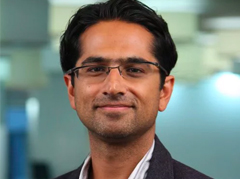
Hasan Bakhshi
Executive Director - Creative Economy and Data Analytics - NESTA
Hasan Bakhshi oversees Nesta’s creative economy policy, research and practical work. He co-authored the Next Gen skills review of the video games and VFX industries, which led to reforms of the school ICT curriculum in England, and the Manifesto for the Creative Economy, which set out recommendations by which governments can help the creative economy grow. In 2015, he co-authored Creativity vs Robots, which explores how resistant are different creative occupations to future automation. In 2017, he co-authored The Future of Skills: Employment in 2030 which combines foresight methods and machine learning to predict the likely workforce skills mix in the future.
Prior to Nesta, Hasan worked as an economist at Lehman Brothers, the Foreign and Commonwealth Office and the Bank of England.
Hasan is Adjunct Professor at the Queensland University of Technology, and sits on the Creative Industries Council. He is Director of the AHRC’s new Creative Industries Policy and Evidence Centre.
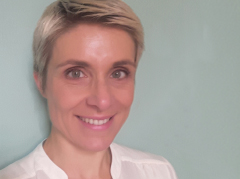
Dr Doris Ruth Eikhof
Deputy Director - CAMEo Research Institute, University of Leicester
Doris joined the University of Leicester in 2014 and previously worked as a Lecturer in Work and Organisation Studies at the University of Hamburg and Stirling, Scotland. She holds a PhD and a Diplom in Business Administration (integrated Master’s and Bachelor’s degree) from the University of Hamburg.
As Deputy Director of the CAMEo Research Institute at the University of Leicester, her research focuses on careers and employment of cultural workers, focusing in particular on career management, self-entrepreneurship and workforce diversity and how they interlink e.g. with cultural organisations’ business models and cultural policy. Since 2009, Doris has led 15 funded research projects including the Digital R&D Fund for Arts and Culture in Scotland funded by the AHRC, Nesta and Creative Scotland and projects for the British Film Institute, Creative Scotland and various arts organisations. Before joining academia, Doris worked as an HR Officer for a ThyssenKrupp subsidiary in Hamburg.”
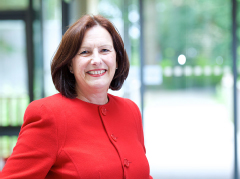
Prof Lady Rachel Cooper
Chair in Design - Lancaster University
Rachel Cooper OBE is Distinguished Professor of Design Management and Policy at Lancaster University. She is Director of ImaginationLancaster, an open and exploratory design-led research centre conducting applied and theoretical research into people, products, places and their interactions, and also Chair of Lancaster institute for the Contemporary Arts. Professor Cooper’s research interests cover: design thinking; design management; design policy; and across all sectors of industry, a specific interest in design for wellbeing and socially responsible design. She has published extensively on these topics, including books ‘Designing Sustainable Cities’, ‘The Handbook of Wellbeing and the Environment’ and ‘Living in Digital Worlds’. She is also series editor of the Routledge series Design for Social Responsibility covering topics such as designing for sustainability, inclusivity, service design, sport, health, transport and policy. She was founding editor of The Design Journal and also founding President of the European Academy of Design. She is President of the Design Research Society.
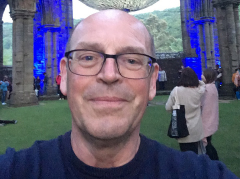
Prof David Bull
Director - Bristol Vision Institute, University of Bristol
David Bull holds the Chair in Signal Processing at the University of Bristol, having previously been a Lecturer at Cardiff University and a Systems Engineer for Rolls Royce. He was Head of the Electrical and Electronic Engineering Department at Bristol between 2001 and 2006 and is now Director of Bristol Vision Institute, which he co-founded in 2008. David has worked widely in the fields of image and video processing and video communications and has published over 450 academic papers and articles and has written or edited four books. He has regularly consulted for many major companies, organisations and governments across the world and currently acts as a strategic advisor to EPSRC. David co-founded ProVision Communication Technologies, Ltd. in 2001 and was its Director and Chairman until it was acquired in 2011. David is a chartered engineer and a Fellow of the IEEE.
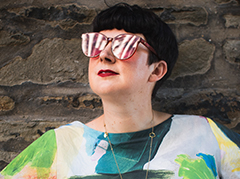
Clare Reddington
Creative Director & CEO - Watershed
Clare joined Watershed in 2004, establishing its creative technology programmes including Pervasive Media Studio and Playable City. She become Creative Director in 2014, looking after the Studio, engagement and cinema teams, and CEO in 2018. Clare works with industry, academic and creative partners from around the world to champion inclusion, support talent and develop new ideas. Clare was Executive Producer of REACT, and is a Visiting Professor at University of the West of England. She is chair of Emma Rice’s Wise Children, and on the boards of RSC and Theatre Bristol.
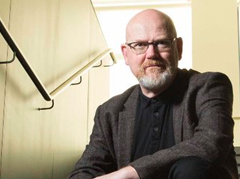
Prof Andrew Chitty
Creative Economy Champion - AHRC Creative Economy Programme
Professor Andrew Chitty was appointed Creative Economy Champion for the Arts & Humanities Research Council in January 2017 to foster new and exciting partnerships between academics and the rapidly growing creative industry. With three decades of experience in the creative industries, Professor Chitty’s career began in television, where he focussed on the cultural impact of science and technology.
He founded a BAFTA-winning digital agency that created transformational services for clients across the creative economy Andrew has also worked across policy and regulation as a ministerial advisor and non-executive at OFCOM, and with Innovate UK, the Engineering and Physical Sciences Research Council. He is a former Vice Chair of the producers’ trade body PACT, a board member of Creative Skillset, and a founding director of Creative England.
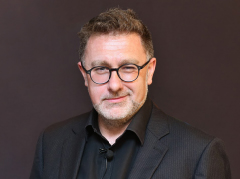
Prof Anthony Lilley
Professor of Creative Industries - Ulster University
Professor Lilley is a media and theatre producer and strategist with an extensive background in innovation and digital media. He is Professor of Creative Industries at Ulster University, a trustee of NESTA and the Crafts Council and Chair of Blast Theory. He has an award-winning track record as a creative in fields including online, mobile, TV, theatre, opera, console games, publishing and journalism.
Previously he has served in various roles at OfCOM, The Gambling Commission and The Space, and held visiting professorships at Oxford and Bournemouth Universities. In 2008, he was awarded the Order of the British Empire (OBE) in the Queen’s Birthday Honours list for services to media and the creative industries.
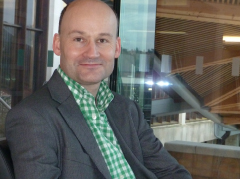
Prof Andrew Thompson
Executive Chair - Arts & Humanities Research Council
Professor Andrew Thompson is Executive Chair of the Arts and Humanities Research Council, previously Interim Chief Executive from December 2015 to March 2017. He is also the UKRI Champion for the Global Challenges Research Fund and the Newton Fund, as well as International Champion for UKRI.
Professor Thompson is a historian of modern empire. He studied for his D.Phil at Nuffield College in Oxford under the supervision of John Darwin, and was later a fixed-term Tutorial Fellow in Modern History at Corpus Christi College. The major strand of his research interests have focused on the effects of empire on British private and public life during the nineteenth and twentieth centuries, with publications including Imperial Britain (2000) and The Empire Strikes Back (2005) and, most recently, a companion volume to the Oxford History of the British Empire series entitled Britain’s Experience of Empire in the Twentieth Century (2012). He co-founded Leeds University’s Institute of Colonial and Postcolonial Studies, and was also previously Dean of the Faculty of Arts, and Pro-Vice Chancellor for Research, at the University of Leeds.
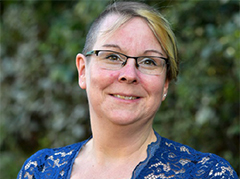
Alexandra Vincent
Chief Operating Officer - Arts & Humanities Research Council
Alex Vincent started her Research Council career with ESRC, first managing their communications and PR before moving to oversee their Economics and Business research portfolio. Her early career started in stage management in the theatre before moving into a career in PR and brand management within the IT industry. This eventually led to Alex managing the communications and PR for a major Heritage Lottery funded Programme for English Heritage
Alex was later Associate Director, Policy and Analysis with Research Councils UK. Here she oversaw the establishment of the Industrial Strategy Challenge Fund within the Research Councils, and the development of cross-Council policy and strategy. She was a member of HEFCW’s Research, Innovation and Engagement Committee and Scottish Funding Council’s Research and Knowledge Exchange Committee. Alex has been Chief Operating Officer at AHRC since September 2018 and is Senior Responsible Owner for Creative Industries Clusters Programme.
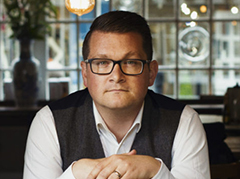
Sol Rogers
CEO & Founder - REWIND
Sol is CEO and Founder of REWIND, an immersive content studio that fuses bleeding-edge technology with award-winning creative storytelling. He is the driving force behind REWIND’s exponential growth and award-winning projects, including the multi-award-winning BBC Home: A VR Spacewalk, and Emmy-nominated Silicon Valley: Inside the Hacker Hostel for HBO.
Sol’s leadership of REWIND and his respected position within the industry sees him regularly speaking at international events, quoted in the media, and appearing on TV. He is also Chairman of Immerse UK, the first nation-wide network for immersive companies and Chairman of BAFTA’s Immersive Entertainment Advisory Group. Before founding REWIND, Sol was one of the youngest Senior Lecturers in the UK, writing four new degrees, two masters and supervising PHDs during his tenure.
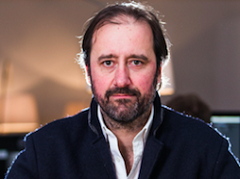
Jonathan Chippindale
Chief Executive - Holition
After starting his career in luxury, Jonathan Chippindale co-founded Holition a decade ago as a venture start-up to explore and expand the ever-evolving role that technology plays in communicating narrative to today’s consumer. The result is a synthesis of mathematicians, scientists and technologists, artists and psychologists, retail specialists and cutting edge leaders in
innovative thinking.
Holition crafts premium digital experiences for a network of pioneering brands across the luxury, fashion and beauty industries. Jonathan is an External Industry Advisor and Visiting Professor at Central St Martins and the London College of Fashion where he was a co-creator of the UAL Digital Think Tank, a mentor to BBC Worldwide Labs and Techstars, as well as advisor to the University of Cambridge Digital Compass Group. He is a Digital Advisor to the British Fashion Council and Innovation Advisor to the Tate museums. Jonathan holds an Honorary Doctorate from University of Arts London.

Jennifer Davies
Chief Executive - Holition
Jennifer Davies grew up in Cheshire. She was previously signed as a singer and songwriter to Universal Records until 2015, and had worked with fashion designer Nabil Nayal. He had lent his creations and helped style Jennifer’s photo and video shoots. Nabil was shortlisted for the LVMH prize in 2015 and beginning to make a name for himself as a designer. Jennifer, with a life-long love of fashion, joined him at an exciting time to help build the brand. She has an MSc in Operations & Supply Chain Management and is currently undertaking a research doctorate at the University of Liverpool Management School in Sustainable Supply Management within the fashion industry.
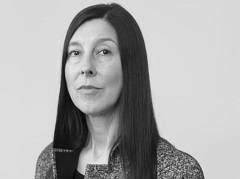
Jane Harris
Professor of Digital Design & Innovation Associate Dean of Research - London College Of Fashion
Jane Harris has over 20 years experience in Design and Transdisciplinary Research within higher education and industry sectors at a national and international level. She currently holds a chair in Digital Design & Innovation at the London College of Fashion (UAL), and is Associate Dean of Research.Her work is a hybrid of design, artefact and experience, with implications for museum, e-commerce, CGI film/game narratives and design realms. She has carried out pioneering imaging work with 3D CGI animation and real time tools. Professor Harris has received fellowships from the National Endowment for Science, Technology and the Arts (NESTA), the Arts Foundation, and awards from the Arts Council of England, Channel 4 and the Rootstein Hopkins Foundation. She is also a member of the AHRC Peer Review College.
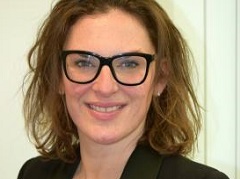
Lynda Petherick
Fashion & Luxury Fashion Lead - Accenture
Lynda Petherick began her career in financial services and moved to the lead Accenture’s UKI fashion and luxury practice back in 2016. Over the past 20 years she has worked in a number of sectors, but always with a focus on working with partners to bring innovation and transformation at both the client and industry levels.
Lynda has had the opportunity to lead transformational programmes that help her clients be relevant and face the challenges presented in today’s commercial and creative environments. Lynda is passionate about addressing the digital disruption facing the fashion industry, together with meeting the evolving needs of the consumer.

Caroline Rush CBE
Fashion & Luxury Fashion Lead - Accenture
Caroline has over 20 years of experience in Marketing and PR across both consumer and corporate communications in fashion, music and lifestyle sectors and previously managed her own business for five years.
Since her appointment in 2009 at the British Fashion Council (BFC), she has strategically re-positioned the council as the leading voice for the British industry both at home and abroad. During her tenure she has helped take British designers to new markets, published the first ever in-depth statistic-based reports on the industry, presided over the launch of several talent initiatives, and given the UK’s menswear industry it’s own platform by creating London Collections: Men, Britain’s only biannual menswear trade showcase.
Through Caroline’s relationships with the government, patrons, sponsors, designers, media and international retailers there has been exponential growth in the value, reach and profile of British fashion, seeing it become a serious player in the global fashion economy.
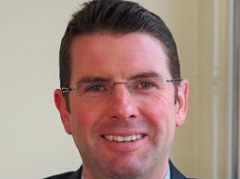
Prof Stephen Russell
Professor of Textile Materials & Technology - University of Leeds
Professor Russell is an internationally renowned nonwoven textiles specialist. He joined the University of Leeds early in his career as a fellow of the Engineering & Physical Sciences Research Council (EPSRC), going on to hold a chair in Textile Materials & Technology. He manages a large programme of research concerned with improving understanding of the process-structure-property relations of nonwoven materials.
Between 2001 and 2004 he worked in industry during which this time he founded Nonwovens Innovation & Research Institute (NIRI Ltd), a spin-out from the University of Leeds. NIRI Ltd specialises in the industrial development of advanced nonwoven materials and processes. Within the institute he oversees the technical directions of product development and manufacturing methods. Stephen is an editorial board member of two key journals within textile research, and was made an honorary Liveryman of the Clothworkers Company and a Freeman of the City of London in 2013.
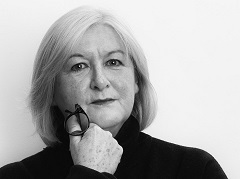
Kate O’Connor
Independent Skills & Policy Consultant - Digital Labs Expert Advisor
Kate has over twenty years’ experience working with creative, digital and screen agencies, employers and government departments at a senior level. In 2015 she established a consultancy practice specialising in policy & strategy, education, and skills with both public and private sector clients. Projects range from supporting the development of the Yorkshire Screen Cluster, establishing a new industry body for the Animation sector, advising on skills policy in Myanmar and Nigeria and carrying out a Skills Audit for AHRC Creative Economy Programme.
Prior to establishing her consultancy Kate was Executive Director of Creative Skillset, the Creative Industries Sector Skills Council, responsible for policy, development and sector engagement including enhancing links between the sector and education.
Kate is also Executive Chair of Animation UK, Board member of UK Screen Alliance, member of BAFTA, Chair of the BFI Research Committee and co-director of Creative Media Labs and Trustee of charity You Make It.
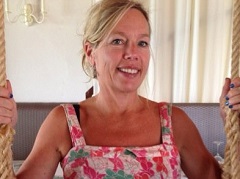
Amanda Murphy
Executive Producer, StoryFutures Academy - Royal Holloway, University of London
Amanda Murphy is an accomplished award-winning Producer with a reputation for devising and producing complex pioneering successes such as the UK’s first Big Brother in 2000 and global hit series Supernanny which she devised and Executive Produced for both Channel 4 in the UK and ABC, America.
At Royal Holloway she has created a new digital archive of 100+ hours of films reuniting TV veterans with original kit, and using up to 14 cameras in a fixed rig, to fully capture their hands on experience of re-using the tools of their jobs to tell the story of how television was made in the early heroic years.
Amanda is interested in digital legacy, and cutting edge storytelling whether for broadcast, a digital platform or an immersive experience. Via her teaching and mentoring, she is focusing on developing next generation storytellers.

Prof Chris Speed
Professor of Design Informatics, University of Edinburgh
Chris Speed is Chair of Design Informatics at the University of Edinburgh where he collaborates with a wide variety of partners to explore how design provides methods to adapt and create products and services with a networked society. He especially favours transgressive design interventions, to help identify and promote the values we care about most, including design for the blockchain, an application for sham marriages, and an SMS platform for shoplifting.
Chris is co-editor of the journal Ubiquity and co-directs the Design Informatics Research Centre, home to a combination of researchers working across interaction design, temporal design, anthropology, software engineering and digital architecture. He has a track record of directing large complex grants with industry partners, and over the past 9 years has been involved with research grants across ESPRC, ESRC and AHRC totalling over £21m. Chris is also a member of the EPSRC Digital Economy PAB.

LANI JACOBS
Digital Anthropologist - Girl Effect
Lani Jacobs is a Digital Anthropologist at Girl Effect, working at the cutting edge of research that explores how vulnerable people, and particularly girls and young women around the world, engage with digital technology. A member of the Digital Evidence team, Lani focuses on how the organisation’s digital brands can support behaviour change amongst adolescent girls.

MYRA APPANNAH
Writer, Director, Immersive Technologist - SE14 LTD
Myra explores storytelling across form and media. As the writer and director of ‘SOMNAI’, she took the largest-scale immersive tech experience from concept to live in six months, working with 17 multi-disciplinary partners. The Guardian described it as “the trippy VR experience that takes you to dreamland”, TimeOut as “…an episode of Black Mirror”. Culture Whisper gave it 5 stars, saying “the real impact comes from the interplay between virtual reality and a more traditionally theatrical use of space and performance.”
She was commissioned by Southwark Council to bring the history of Southwark to life and created its first live, AR experience. Recently, she worked with the British Council to help create PlayUK, the first art/gaming/VR festival. Her first short film, ‘Garfield’ won awards and was selected for film festivals including Sundance 2018 and BAFTA. She has been telling transmedia stories for brands like Adidas, Jaguar and Guinness for 15 years. And has worked with charity Cardboard Citizens, using forum theatre to help vulnerable people.
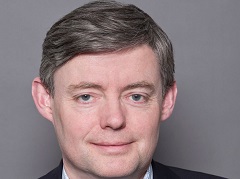
Patrick Bradley
Managing Partner - Station 12
Patrick Bradley began his professional career as a lawyer in the City of London, before branching into media with PolyGram (now Universal Music), working in M&A, including the acquisitions of Really Useful Group, Island Records and Working Title films.
He subsequently worked at Liberty/UPC and Universal Studios, joining Ingenious Ventures in 2000, where he became head of ventures. The business backed successes such as Simon Fuller’s 19 Management (of American Idol fame), video games producer Lionhead (Fable), EDM operator Cream (Creamfields) and rights distributor Digital Rights Group (Doc Martin).
Patrick founded Station12 in 2014, to provide advice and investment to companies in the media, entertainment and knowledge sectors. Current investments include businesses in live events, TV and education. He is a governor of the University for the Creative Arts and Into Film, the education charity. He was formerly a trustee of the National Army Museum.
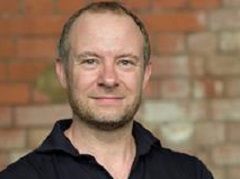
JOHN CASSY
CEO & Co-Founder - Factory 42
John Cassy worked in senior roles at Sky for 10 years, launching and running new channels and technology, working across genres from sports to factual, music and arts. His work included establishing the leading UK arts channel, Sky Arts.
John is co-founder and Chief Executive at Factory 42, an immersive and television content production studio. The company uses advanced imaging technologies including virtual reality, augmented reality and mixed reality to bring unique multi-sensory experiences to broadcasters, brands, destinations and artists. Recent projects include a holographic VR production with Sir David Attenborough, and Painting the Future, a multiplatform event for The Royal Academy of Arts. John is a board Governor of the International Advanced Imaging Society in Los Angeles, as well as a Trustee of the Almeida Theatre.

Prof Marian Ursu
Chair of Interactive Media - University of York
Professor Marian Ursu is the Chair of Interactive Media at University of York, an interdisciplinary subject area he developed in the Department of Theatre Film and Television, which is placed at the confluence of creative practice with technology. He is Co-Director of Digital Creativity Labs, one of the six UK’s next stage digital economy centres (starting from 2015), and Creative Media Labs (recently awarded), one of the nine UK’s creative industries clusters partnerships, collectively representing a £25m investment by UKRI, academia and a wide range of industry and third sector partners in research and development in creative industries. Before joining York (2013), Marian worked in the Department of Computing at Goldsmiths University of London and was instrumental in the reshaping it from a traditional mathematical and computer science department into one of creative computing, embracing the creative industries. As part of this, he secured major research funding and led research in large international consortia, aiming to create new forms of mediated communication and artistic expression as well as dedicated digital technologies for their realisation, including interactive storytelling and responsive narratives, intelligent telepresence and immersive theatre.

PROF SIR MARK WALPORT
Chief Executive, UK Research and Innovation
Sir Mark is Chief Executive of UK Research and Innovation, which brings together the seven Research Councils, Innovate UK and Research England. UKRI operates across the UK with a combined budget of more than £6 billion.
As former Director of the Wellcome Trust, Sir Mark has experience running a large scale research organisation and global charitable foundation. A distinguished scientist in his own right, Sir Mark was also Professor of Medicine and Head of the Division of Medicine at Imperial College London. Previous career highlights for Sir Mark include being a member of the India UK CEO Forum and the UK India Round Table, a member of the advisory board of Infrastructure UK and a non-executive member of the Office for Strategic Coordination of Health Research.
He received a knighthood in the 2009 for services to medical research and was elected as Fellow of The Royal Society in 2011.
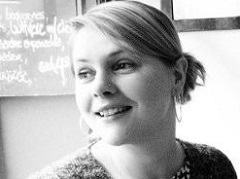
Eleanor Whitley
Executive Producer - Marshmallow Laser Feast
Eleanor has a reputation for driving forward ambitious work in a variety of forms – live events, art installations & digital media. Her collaborations with Marshmallow Laser Feast, where she is Executive Producer, demonstrate a unique vision for the future of creative experiences. Marshmallow Laser Feast is a creative studio that explores technology to make work which reinterprets the idea of human perception. Their work is responsive and spans kinetic sculpture, film, live performance and virtual reality.
Eleanor has produced the critically acclaimed In the Eyes of the Animal (Sundance New Frontier 2016, Wired Award for Innovation in Experience Design) and other mixed reality works including; A Colossal Wave (SXSW 2018), Treehugger (Tribeca Film Festival Storyscapes Award 2017) and Chameleon (IDFA Doclab 2016). She is a recipient of the BFI Vision Award.

